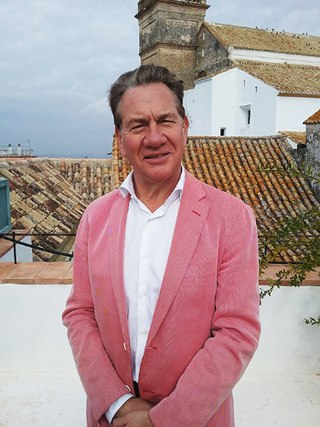
Michael Denzil Xavier Portillo is a British journalist, broadcaster, and former Conservative Party politician. His broadcast series include railway documentaries such as Great British Railway Journeys and Great Continental Railway Journeys. A former member of the Conservative Party, he was Member of Parliament (MP) for Enfield Southgate from 1984 to 1997 and Kensington and Chelsea from 1999 to 2005.
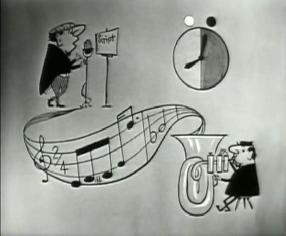
Hancock's Half Hour was a BBC radio comedy, and later television comedy series, broadcast from 1954 to 1961 and written by Ray Galton and Alan Simpson. The series starred Tony Hancock, with Sidney James; the radio version also co-starred, at various times, Moira Lister, Andrée Melly, Hattie Jacques, Bill Kerr and Kenneth Williams. The final television series, renamed simply Hancock, starred Hancock alone.
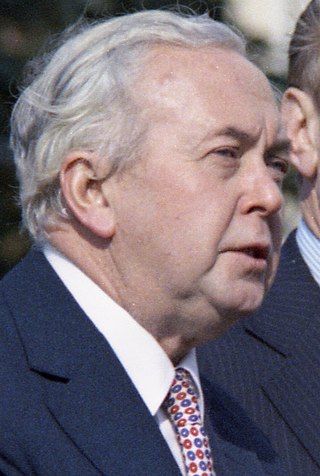
The February 1974 United Kingdom general election was held on Thursday 28 February 1974. The Labour Party, led by Leader of the Opposition and former Prime Minister Harold Wilson, gained 14 seats but was seventeen short of an overall majority. The Conservative Party, led by incumbent Prime Minister Edward Heath, lost 28 seats. That resulted in a hung parliament, the first since 1929. Heath sought a coalition with the Liberals, but the two parties failed to come to an agreement and so Wilson became prime minister for a second time, his first with a minority government. Wilson called another early election in September, which was held in October and resulted in a Labour majority. The February election was also the first general election to be held with the United Kingdom as a member state of the European Communities (EC), which was widely known as the "Common Market".

Dame Angela Eagle DBE is a British Labour Party politician serving as the Member of Parliament (MP) for Wallasey since 1992. Eagle has served as Minister of State for Border Security and Asylum since July 2024.
Robert Michael Kilroy-Silk is an English former politician and broadcaster. After a decade as a university lecturer, he served as a Labour Party Member of Parliament (MP) from 1974 to 1986. He left the House of Commons in 1986 in order to present a new BBC Television daytime talk show, Kilroy, which ran until 2004. He returned to politics, serving as a Member of the European Parliament (MEP) from 2004 to 2009. He had a profound role in the mainstreaming of Eurosceptic politics in the UK and has been dubbed 'The Godfather of Brexit'.
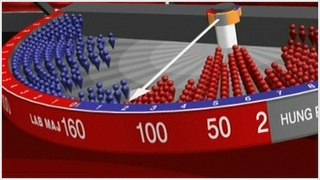
The swingometer is a graphics device that shows the effects of the swing from one party to another on British election results programmes. It is used to estimate the number of seats that will be won by different parties, given a particular national swing in the vote towards or away from a given party, and assuming that that percentage change in the vote will apply in each constituency. The device was invented by Peter Milne, and later refined by David Butler and Robert McKenzie.

Eric "Ricky" Tomlinson is an English actor. He is best known for his television roles as Bobby Grant in the soap opera Brookside (1982–1988), DCI Charlie Wise in Cracker (1993–2006) and Jim Royle in The Royle Family (1998–2012). He also played the titular character in the 2001 football mockumentary Mike Bassett: England Manager.

Folkestone and Hythe is a constituency in Kent represented in the House of Commons of the UK Parliament since 2024 by Tony Vaughan, a Labour MP.

Dumfries and Galloway is a constituency in Scotland represented in the House of Commons of the UK Parliament by John Cooper of the Scottish Conservatives since the 2024 general election. It was first contested in the 2005 general election, replacing Galloway and Upper Nithsdale and part of Dumfries. Like all British constituencies, it elects one Member of Parliament (MP) by the first-past-the-post system of election. Despite its name, it does not cover the whole of the Dumfries and Galloway council area.

The 2005 United Kingdom general election was held on Thursday 5 May 2005, to elect 646 members to the House of Commons. The governing Labour Party led by the prime minister Tony Blair won its third consecutive victory, with Blair becoming the second Labour leader after Harold Wilson to form three majority governments. However, its majority fell to 66 seats; the majority it won four years earlier had been of 167 seats. The UK media interpreted the results as an indicator of a breakdown in trust in the government, and especially in Blair.

The 2010 United Kingdom general election was held on Thursday 6 May 2010, to elect Members of Parliament to the House of Commons. The election took place in 650 constituencies across the United Kingdom under the first-past-the-post system. The election resulted in a large swing to the opposition Conservative Party led by David Cameron similar to that seen in 1979, the last time a Conservative opposition had ousted a Labour government. The governing Labour Party led by the prime minister Gordon Brown lost the 66-seat majority it had previously enjoyed, but no party achieved the 326 seats needed for a majority. The Conservatives won the most votes and seats, but still fell 20 seats short. This resulted in a hung parliament where no party was able to command a majority in the House of Commons. This was only the second general election since the Second World War to return a hung parliament, the first being the February 1974 election. This election marked the start of Conservative government for the next 14 years.

Sir Michael Alan Penning is a British Conservative Party politician, who served as the member of parliament (MP) for Hemel Hempstead from 2005 to 2024.
James Edward Fleet is an English actor of theatre, radio and screen. He is most famous for his roles as the bumbling and well-meaning Tom in the 1994 British romantic comedy film Four Weddings and a Funeral and the dim-witted but kind-hearted Hugo Horton in the BBC sitcom television series The Vicar of Dibley. Since 2020, he has played King George III in the Netflix Bridgerton.

Iain Dale is a British broadcaster, author, political commentator, and a former publisher and book retailer. He has been a blogger since 2002. He was the publisher of the Total Politics magazine between 2008 and 2012, and the managing director of Biteback Publishing until May 2018. Since September 2010, he has hosted a regular discussion show on the radio station LBC. He was named Radio Presenter of the Year at the Arqiva Commercial Radio Awards in 2013 and 2016. On 28 May 2024, he announced that he was quitting his LBC roles to run as an MP in the 2024 United Kingdom general election, only to abandon his campaign three days later. He returned to his usual LBC slot on 3 June.
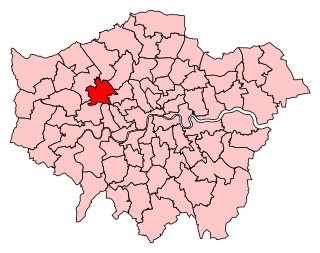
Brent Central was a constituency in Greater London, represented in the House of Commons of the UK Parliament from 2015 until its abolition for the 2024 general election by Dawn Butler of the Labour Party.

The 2011 Scottish Parliament election was held on Thursday, 5 May 2011 to elect 129 members to the Scottish Parliament.

A general election was held in the United Kingdom on 6 May 2010 and all 59 seats in Scotland were contested. The election result in Scotland was unusual in that there wasn't any change of seats from the 2005 general election, although the Labour Party took back two seats that it had lost in by-elections. This was the last general election at which the Labour Party won a majority of seats and plurality of votes in Scotland until 2024.

Tracey Breaks the News is a British topical comedy programme starring Tracey Ullman. It premiered on BBC One on 27 October 2017 following a one-off special that aired on 23 June.